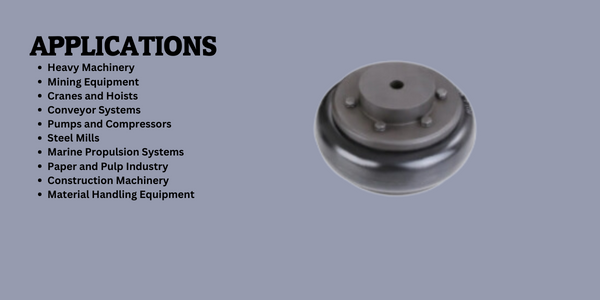Tyre Coupling Applications: Enhancing Industrial Machinery Efficiency
Introduction
In industrial machinery, the efficiency and reliability of couplings are paramount. Tyre couplings, a versatile option, have gained significant traction due to their ability to absorb shock, accommodate misalignment, and dampen vibration. In this article, we delve into the diverse applications of Tyre couplings, exploring how they optimize machinery performance across various industries.
Tyre Coupling Applications in Industry
1. Manufacturing Sector
In the manufacturing sector, where precision and reliability are crucial, Tyre couplings find extensive applications. They facilitate smooth power transmission between various components, ensuring seamless operation of conveyors, mixers, and other machinery.
2. Mining and Quarrying
In harsh environments like mines and quarries, machinery faces rigorous conditions. Tyre couplings excel in such settings, providing flexibility to withstand shock loads and torsional vibrations. They are integral to the efficient functioning of crushers, screens, and heavy-duty conveyors.
3. Power Generation
Tyre couplings play a pivotal role in power generation applications, connecting prime movers to generators with minimal backlash. Their ability to dampen torsional vibrations ensures stable operation, enhancing the overall efficiency of turbines and generators in both conventional and renewable energy plants.
4. Oil and Gas Industry
The oil and gas industry demands robust coupling solutions to withstand extreme conditions encountered during exploration, drilling, and production activities. Tyre couplings offer resilience against shock loads, torsional vibrations, and misalignment, making them indispensable in pump drives, compressors, and drilling equipment.
5. Marine and Offshore
In marine and offshore applications, where machinery operates in challenging marine environments, Tyre couplings provide reliable power transmission while dampening vibration and reducing noise. They are commonly used in propulsion systems, thrusters, and auxiliary machinery on ships and offshore platforms.
6. Agriculture
In agricultural machinery, where reliability and durability are paramount, Tyre couplings ensure smooth power transmission between various components such as engines, gearboxes, and implements. Their ability to absorb shock loads and accommodate misalignment enhances the performance and longevity of agricultural equipment.
Conclusion
In conclusion, tyre couplings offer a versatile solution for optimizing machinery performance across diverse industries. Their ability to absorb shock, accommodate misalignment, and dampen vibration makes them indispensable in applications where reliability and efficiency are paramount. By understanding their applications and benefits, industries can harness the full potential of Tyre couplings to enhance productivity and operational efficiency.
Tyre couplings feature elastomeric elements that act as cushions, absorbing shock loads and reducing stress on connected machinery.
Yes, Tyre couplings can accommodate angular, parallel, and axial misalignment, ensuring smooth operation and reducing wear on connected components.
While Tyre couplings are primarily designed for torque transmission, they can be optimized for high-speed applications by selecting appropriate materials and designs.
Regular inspection for wear, lubrication of elastomeric elements, and alignment checks are essential for ensuring optimal performance and longevity of Tyre couplings.
Yes, certain Tyre coupling designs are available with certification, making them suitable for use in explosive atmospheres common in industries such as oil and gas.
By damping torsional vibrations and reducing backlash, tyre couplings minimize energy losses associated with vibration and misalignment, thereby improving overall energy efficiency.






